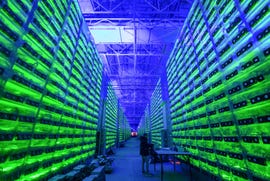[ad_1]
Our lead story this week is a Friday ruling from the US Securities and Exchange Commission that ordered Nvidia to pay a $5.5 million fine for what the SEC characterized as inadequately disclosing how much of the company’s sales of graphics chips stemmed from cryptocurrency mining.
We’ll also cover an NFT sale that rocked the ethereum network, the expansion of the SEC’s crypto enforcement unit, Wikipedia ending cryptocurrency donations, and Square Enix selling the Tomb Raider franchise to invest in blockchain and other technologies.
Nvidia fined $5.5M over cryptomining disclosures

A cryptocurrency mining operation.
Getty Images
The SEC said Friday that Nvidia didn’t adequately disclose how cryptocurrency mining impacted its sales of graphics chips. According to an SEC release, “during consecutive quarters in NVIDIA’s fiscal year 2018, the company failed to disclose that cryptomining was a significant element of its material revenue growth from the sale of its graphics processing units (GPUs) designed and marketed for gaming.”
As part of the settlement with the SEC, Nvidia didn’t admit to or deny the findings.
Cryptocurrency mining often relies on higher-end graphics cards, like those used for video games, which some publications, like the BBC, PCMag and Tech Radar, have reported may be partly responsible for a graphics card shortage.
Read CNET’s full story on Nvidia’s $5.5M fine over cryptocurrency mining disclosure here.
Ethereum transactions skyrocket after NFT sale of digital land plots

A physical mockup of a digital ether coin.
Getty Images
Bored Ape Yacht Club, owned by parent company Yuga Labs, is one of the better-known NFT collections. The BAYC brand is expanding into an online video game, and on Saturday, Yuga Labs released a collection of digital land grant NFTs to be used inside this game. Each NFT land grant sold for a little under $6,000.
Like most nonfungible tokens, Borred Ape Yacht Club NFTs are built on the ethereum blockchain. Transactions on ethereum come with fees, called gas fees. Gas fees increase as growth occurs in the number of people engaging in transactions at any given time. The NFT land grants turned out to be so popular that gas fees skyrocketed and transactions became incredibly expensive. One person paid $44,000 in gas fees alone to buy two NFT land plots. In about three hours, Yuga Labs made around $320 million and sold 55,000 digital land plots.
Read CNET’s full story on how Bored Ape Yacht Club broke the ethereum network here.
SEC bolsters crypto enforcement with new personnel

Angela Lang/CNET
The Securities and Exchange Commission said Tuesday that it’s adding 20 new positions to its Crypto Assets and Cyber Unit, which protects crypto investors and safeguards against cyberthreats. “As more investors access the crypto markets, it is increasingly important to dedicate more resources to protecting them,” said SEC Chair Gary Gensler. “By nearly doubling the size of this key unit, the SEC will be better equipped to police wrongdoing in the crypto markets while continuing to identify disclosure and controls issues with respect to cybersecurity.”
Read CNET’s full story on the Crypto Assets and Cyber Unit expansion here.
Wikipedia sunsets cryptocurrency donations

The world’s seventh largest website is set to stop accepting cryptocurrency donations. The Wikimedia Foundation, which runs Wikipedia, voted on the decision last month, citing environmental and ethical concerns. “We began our direct acceptance of cryptocurrency in 2014 based on requests from our volunteers and donor communities,” the foundation said on May 1. “We are making this decision based on recent feedback from those same communities.” The website plans to close its Bitpay account, eliminating its ability to accept crypto donations going forward. The foundation further noted they’d continue to monitor the situation.
Bitcoin, the most popular of all cryptocurrencies, is an energy hog that is estimated to use as much energy every year as some countries, such as Norway and Sweden. And some critics say cryptocurrencies raise ethical questions related to money laundering, tax evasion and ransomware, among other things.
Read CNET’s full story on The Wikimedia Foundation’s decision to end cryptocurrency donations here.
Square Enix sells Tomb Raider to invest in blockchain, AI and cloud technologies

Getty Images
Video game giant Square Enix, the same company that makes the popular Final Fantasy series, sold the Tomb Raider franchise to free up cash for investments in fields including blockchain, AI and the cloud. Square Enix has previously expressed interest in NFTs. The company’s president, Yosuke Matsuda, said in a Jan. 1 letter that “the advent of NFTs using blockchain technology significantly increased the liquidity of digital goods, enabling the trading of a variety of such goods at high prices and sparking conversations the world over.” In the letter, Matsuda also noted that NFT trading seems overheated with “somewhat speculative overtones.”
Read CNET’s full story on Square Enix selling the Tomb Raider franchise here.
Thanks for reading. We’ll be back with plenty more next week. In the meantime, check out this story by Scott Stein about how the metaverse is trying to figure out your comfort zone.
[ad_2]
Source link
